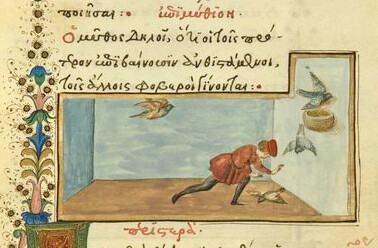HODIE: Kalendae Martiae, the Kalends of March!
GOOGLE BOOKS: Today's Google Books are Weber's Aspects of Death and Hessler's Latin Epigram of the Middle English Period.
MYTHS & LEGENDS: The art image for today's legend shows Odysseus and Diomedes; you can also see the legends for the current week listed together here.

TODAY'S DISTICHS & EMBLEMS: All the distichs come with vocabulary lists!
RHYMING DISTICHS: The two new Rhyming Distichs are O felix mortale genus, O felix mortale genus, si semper haberet / Aeternum prae mente decus mortemque timeret; and Sic fac ut nulla, ic fac ut nulla sine fructu transeat hora: / Sic fit hora brevis et labor ipse levis.
CATO'S DISTICHS: The two new Cato Distichs are Contra verbosos, Contra verbosos noli contendere verbis: / Sermo datur cunctis, animi sapientia paucis; and Successu indignos, Successu indignos noli tu ferre moleste: / Indulget Fortuna malis, ut vincere possit.
MARTIAL'S DISTICHS: The two new Martial Distichs are Cur non mitto meos, Cur non mitto meos tibi, Pontiliane, libellos? / Ne mihi tu mittas, Pontiliane, tuos; and A servo scis, A servo scis te genitum blandeque fateris, / cum dicis dominum, Sosibiane, patrem.
OWEN'S DISTICHS: The two new Owen epigrams, with Harvey's English versions, are Brevitas, Perspicua brevitate nihil magis afficit aures; / In verbis, ubi res postulat, esto brevis; and Dives, In coelum dives cur raro ascendit? Avarum / Poenitet expensi, praeterea nihili.
CAMERARIUS'S EMBLEMS: The two new emblems are Cunctando Proficit, Festinare nocet, nocet et cunctatio saepe: / Tempore quaeque suo qui facit, ille sapit; and Regio Haud Religio, Non mihi religio cordi est, sed amor regionis; / Nimirum regio in religione latet..
ROLLENHAGEN'S EMBLEMS: The two new emblems are Tutius Ut Possit Figi, Tutius ut possit figi maris anchora fundo, / Adiuvat humanam piscis amicus opem; and Pro Gallinis, Ut pro gallinis victoriae amore salaces, / Non praedae, galli bella cruenta movent.

TODAY'S MOTTOES & PROVERBS:
TINY MOTTOES: Today's tiny motto is: Invidere sperno (English: I refuse to envy).
3-WORD PROVERBS: Today's 3-word verb-less proverb is Dux vitae ratio (English: Reason is the guide of life)
AUDIO PROVERBS: Today's audio Latin proverb is Alter frenis, alter eget calcaribus (English: One person has need of reins, another of spurs). To read a brief essay about this proverb and to listen to the audio, visit the Latin Via Proverbs blog.
PUBLILIUS SYRUS: Today's proverb from Publilius Syrus is: Nullus est tam tutus quaestus, quam quod habeas parcere (English: There is no profit so safe as being frugal with what you've got).
ERASMUS' ANIMALS: Today's animal proverb from Erasmus is Hinnulus leonem (English: The fawn is provoking the lion; from Adagia 1.3.49 - needless to say, the poor fawn is looking for trouble!).
TODAY'S FABLES & STORIES:
ANECDOTE OF THE DAY: Today's anecdote is Mausolus, the story of King Mausolus and his mausoleum.
FABULAE FACILES WIDGET: The fable from the Fabulae Faciles widget is Lupus et Pastor, Compatres, the story of a foolish man who left his flock in care of the wolf (this one also has a vocabulary list).
MILLE FABULAE WIDGET: The fable from the Mille Fabulae et Una widget is Viatores Duo et Bipennis, a story about sharing in both good times and bad.
AESOP IN ENGLISH VERSE: Today's fable from the English verse widget is Horse and Man, the story of a fateful choice made by a horse that would alter its life forever.
MILLE FABULAE: The "chunk" of Mille Fabulae et Una today is Fable 511, Cuculus et Misinga, through Fable 520, Columbae Duae, Maritus et Uxor, including Columba et Hydria Picta, the story of the dove who was fooled by a painting: Columba, siti compulsa, aquam ut inveniret, huc illuc ambulaverat. Conspecta deinde picta in pariete hydria, vas aqua plenum se invenisse credens, celeri impetu petiit potum. Sed semianimis illisa parieti concidit humi. Morti ergo vicina, sic secum locuta est, “Infelix ego et misera, quae, aquae nimis appetens, non cogitaram vitae periculum.”
